Books
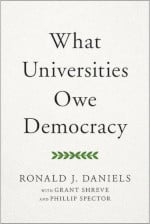
What Universities Owe Democracy
Ronald J. Daniels, with Grant Shreve and Phillip Spector (Johns Hopkins University Press, 2021)
As more countries are moving toward autocracy than in the past several decades, this book argues that American colleges and universities should reclaim the crucial role they have played within modern democracies. Ronald J. Daniels, a law and economics scholar, identifies four key ways that colleges and universities support democracy: social mobility, civic education, the stewardship of facts, and the cultivation of pluralistic, diverse communities. The book examines how institutions developed these capacities over time, where and how they have fallen short, and what they can do to renew their roles as core democratic institutions. Daniels has served as John Hopkins University’s (JHU) 14th president since 2009; he delivered a plenary address on this topic at CIC’s 2022 Presidents Institute. Grant Shreve is a senior writer in JHU’s Office of the President, and Phillip Spector is cofounder of the Peter Gruber Rule of Law Clinic at Yale Law School and previously served as the vice president for strategic initiatives at JHU.
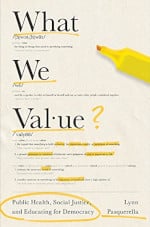
What We Value: Public Health, Social Justice, and Educating for Democracy
Lynn Pasquerella (University of Virginia Press, 2022)
Lynn Pasquerella—a philosopher and medical ethicist, current president of the American Association of Colleges & Universities, and former president of Mount Holyoke College—examines urgent issues to assert that a liberal arts education provides the best preparation for work, citizenship, and life. In three essays, Pasquerella addresses medical ethics and public health in the wake of the pandemic; challenges surrounding free speech, equity, and inclusion on American campuses; and racial and economic segregation in higher education. The essays demonstrate the value of a liberal education in providing the skills and competencies, alongside the habits of heart and mind, that students need to address difficult questions about the tension between individual rights and collective responsibilities.

It’s Not Free Speech: Race, Democracy, and the Future of Academic Freedom
Michael Bérubé and Jennifer Ruth (Johns Hopkins University Press, 2022)
It’s Not Free Speech considers the ideal of academic freedom in the wake of recent activism sparked by police brutality, white supremacy, and the #MeToo movement. Asking whether academic freedom should extend to racist professors, the authors argue that academic freedom must be distinguished from freedom of speech and that the parameters and practices of academic freedom should be reconsidered. They reimagine shared governance to augment both academic freedom and antidiscrimination initiatives on campuses—giving faculty committees more power and aligning with the goal of racial equity. Michael Bérubé is Edwin Erle Sparks Professor of Literature at Pennsylvania State University; Jennifer Ruth is a professor of film at Portland State University. They are coauthors of The Humanities, Higher Education, and Academic Freedom: Three Necessary Arguments.
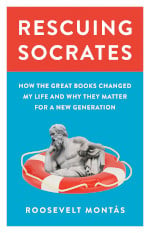
Rescuing Socrates: How the Great Books Changed My Life and Why They Matter for a New Generation
Roosevelt Montás (Princeton University Press, 2021)
Roosevelt Montás emigrated from the Dominican Republic to Queens, New York, when he was 12 and encountered Western classics as an undergraduate in Columbia University’s Core Curriculum. The experience changed his life and determined his academic career. In Rescuing Socrates, Montás weaves together memoir and literary reflection and describes how four authors—Plato, Augustine, Freud, and Gandhi—influenced his life. In doing so, he illustrates what it’s like to experience a liberal arts education—and why he believes it can still remake lives. Montás is senior lecturer at Columbia University’s Center for American Studies and director of its Freedom and Citizenship Program.

Ethics in Higher Education: Promoting Equity and Inclusion through Case-Based Inquiry
Rebecca M. Taylor and Ashley Floyd Kuntz, editors (Harvard Education Press, 2021)
This book illustrates how to apply collaborative, multidisciplinary, philosophical inquiry to deeply complex campus issues. Editors Rebecca M. Taylor and Ashley Floyd Kuntz present seven case studies that focus on a variety of dilemmas, including issues related to Title IX violations, free speech in social media, admissions and access, and the future of historically Black colleges and universities. A diverse group of scholars and practitioners offer commentary and insight—challenging assumptions, raising points omitted from the original cases, and imagining alternative solutions. Taylor is an assistant professor in the Department of Educational Policy, Organization, and Leadership at the University of Illinois at Urbana-Champaign. Kuntz is clinical assistant professor of higher education and director of prestigious scholar development at Florida International University.
Reports
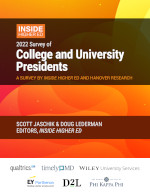
2022 Survey of College and University Presidents
Scott Jaschik and Doug Lederman, editors (Inside Higher Ed and Hanover Research, March 2022)
Inside Higher Ed’s 12th annual
Survey of College and University Presidents probes how campus leaders assess the impact of the pandemic and the ensuing recession on their institutions and industry. Hanover Research conducted the survey during January and February 2022; a total of 375 presidents of two- and four-year institutions responded to the survey (a smaller sample size than usual), 141 of whom were from private nonprofit colleges and universities. Among the results, 94 percent of college and university presidents somewhat or
strongly agree that their institutions were pushed to think outside of the box during the pandemic in a way that will benefit them in the long run. Fifty-six percent of presidents of private colleges and universities like CIC member institutions strongly agree with that statement, compared to 49 percent of leaders of similar public institutions. View the full report.
The Pandemic and Student Engagement: Trends, Disparities, and Opportunities
(National Survey of Student Engagement [NSSE], Indiana University Center for Postsecondary Research, February 2022)
This is the first of three installments NSSE released in February and March 2022 to explore the 2021 edition of
Engagement Insights: Survey Findings on the Quality of Undergraduate Education. Based on information from more than 200,000 first-year and senior respondents at 296 institutions, this installment looks at whether and how student engagement was affected during the 2020–2021 academic year. Only a few of ten engagement indicators and six high-impact practices declined substantially. The six engagement indicators that did not decrease substantially are Higher-Order Learning, Reflective and Integrative Learning, Quantitative Reasoning, Learning Strategies, Effective Teaching Practices, and Quality of Interactions. A comparison between class levels, however, showed that Collaborative Learning and Supportive Environment declined more for first-year students than for seniors. View the installment.

The Pandemic Ripple Effect: Four Potential Long-Term Impacts on College Enrollment and Student Success
Ed Venit (EAB, January 2022)
This EAB whitepaper discusses potential long-term effects of the COVID-19 pandemic on higher education and describes action steps that campus leaders can take to address threats to student enrollment and success. The report focuses on four areas: social disengagement, student mental health issues, lower transfer rates, and unfinished K–12 learning. Suggested solutions include building and expanding virtual communities to engage with and support students; incorporating mental health and well-being touchpoints throughout the curriculum and co-curricular activities; encouraging faculty members to strengthen the collaborative transfer process by assisting with the review of courses and working with partner institutions to align curricula; and increasing investment in advising and student support. View the full report.

The Power of Work-Based Learning
Nichole Torpey-Saboe, Elaine W. Leigh, and Dave Clayton (Strada Education Network, March 2022)
Compensation in internships influences students’ confidence and career outcomes after completing a degree. Drawing on three nationally representative surveys (the U.S. Department of Education’s Baccalaureate and Beyond Longitudinal Survey, the 2021 Strada-Gallup Education Survey, and the 2021 Strada-College Pulse Survey), this report finds that paid internships offer students specific benefits (such as greater earnings, career satisfaction, and confidence after graduation) compared to other work-based learning opportunities (unpaid internships, practicums, and co-ops). The report, however, notes that disparities persist for women, people of color, first-generation, and low-income graduates (see figures below). To make paid internships accessible to more students, the report recommends that institutions increase their partnerships with employers and work to ensure students in non-STEM majors have similar access to high-quality, paid internships to students in STEM disciplines. View the full report.
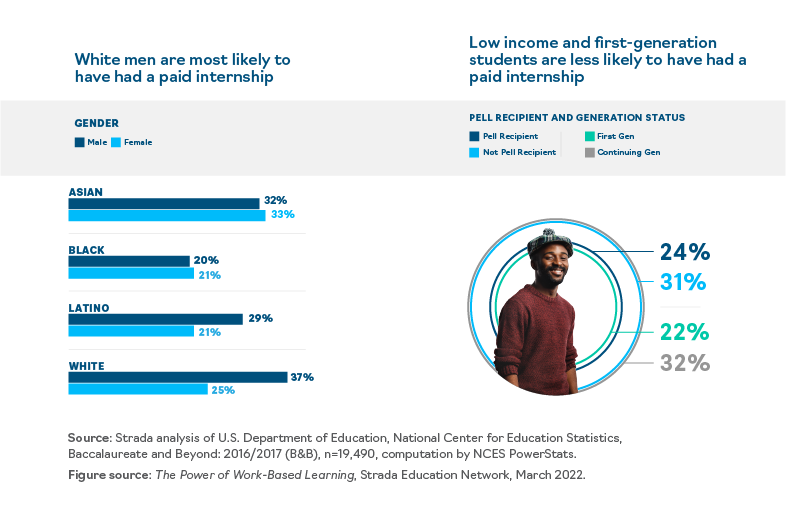
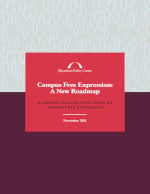
Campus Free Expression: A New Roadmap
Academic Leaders Task Force on Campus Free Expression (Bipartisan Policy Center, November 2021)
The Bipartisan Policy Center’s Academic Leaders Task Force on Campus Free Expression examined the challenges of creating a climate of respectful discourse and analyzed strategies that have worked on various campuses. The resulting roadmap is designed to help leaders strengthen free expression and open inquiry, bolster confidence in U.S. colleges and universities, and prepare Generation Z as citizens and civic leaders. The report urges college leaders to use “leadership capital” to encourage a culture of free expression; tailor strategies to fit the institutions’ unique history, mission, and community; remember that an inclusive and respectful environment for all community members is a prerequisite for freedom of expression; develop programs for all members of the campus community; and establish a decision-making process for clear, consistent, and fair response to controversies about free expression. The taskforce includes current or former leaders of several CIC member institutions: Baylor University (TX), DePauw University (IN), Dillard University (LA), Middlebury College (VT), Rhodes College (TN), and University of Richmond (VA). Download the full report.


